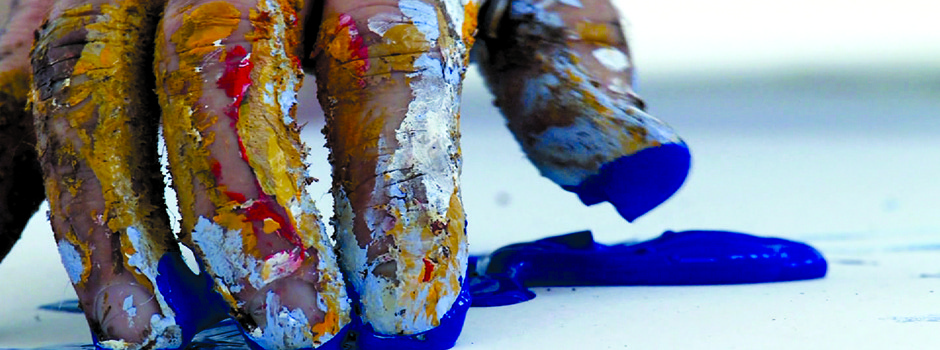Artur Zmijewski
Na ślepo/Blindly
16 Jul - 28 Sep 2014
ARTUR ZMIJEWSKI
Na ślepo/Blindly
16 July – 28 September 2014
Over the last twenty years, Polish artist Artur Zmijewski has produced an important body of works of great emotional intensity. Na ślepo/Blindly, presented in the exhibition Il Palazzo Enciclopedico at the last Venice Biennale, was made with blind people at a painting workshop given by Zmijewski in 2010.
Born in Warsaw in 1966, Artur Zmijewski studied sculpture at the Warsaw Academy of Fine Arts and completed his training at the Gerrit Rietveld Academie in Amsterdam. His formative years, which were deeply influenced by Poland’s throwing off of the Soviet yoke and by the end of the Cold War, led him to a radically innovative practice. His taboo-breaking aesthetic is asserted in his choice of subjects: themes seldom or never represented in contemporary visual culture; oppressed individuals, afflicted by a degenerative disease, or limited by a mental or physical disability. In 2001, Zmijewski worked with a group of deaf-mute teenagers to form an unlikely choir, which he filmed in a church in Poland. In 2003, he repeated the exercise in Leipzig, Germany, in Johann Sebastian Bach’s church. These two Singing Lessons were presented at the Musée as part of the Projections series, in 2008. Na ślepo/Blindly, produced in 2010 with blind people engaged in a painting session which Zmijewski organized and then filmed, carries on this same project of examining our faculty of perception and the right to expression. Two women and four men, some born blind, others who became blind, were invited to paint, under Zmijewski’s guidance, a landscape, an insect, their home or their own image. They interact with the medium of painting, with colour; they describe what they are doing, the kind of image they are painting, and talk about their reality, explaining how they came to be blind. Na ślepo/Blindly ponders the connections made by the senses in the processes of recognition—seeing, being seen—and, like all of Zmijewski’s work, considers our human condition.
Na ślepo/Blindly
16 July – 28 September 2014
Over the last twenty years, Polish artist Artur Zmijewski has produced an important body of works of great emotional intensity. Na ślepo/Blindly, presented in the exhibition Il Palazzo Enciclopedico at the last Venice Biennale, was made with blind people at a painting workshop given by Zmijewski in 2010.
Born in Warsaw in 1966, Artur Zmijewski studied sculpture at the Warsaw Academy of Fine Arts and completed his training at the Gerrit Rietveld Academie in Amsterdam. His formative years, which were deeply influenced by Poland’s throwing off of the Soviet yoke and by the end of the Cold War, led him to a radically innovative practice. His taboo-breaking aesthetic is asserted in his choice of subjects: themes seldom or never represented in contemporary visual culture; oppressed individuals, afflicted by a degenerative disease, or limited by a mental or physical disability. In 2001, Zmijewski worked with a group of deaf-mute teenagers to form an unlikely choir, which he filmed in a church in Poland. In 2003, he repeated the exercise in Leipzig, Germany, in Johann Sebastian Bach’s church. These two Singing Lessons were presented at the Musée as part of the Projections series, in 2008. Na ślepo/Blindly, produced in 2010 with blind people engaged in a painting session which Zmijewski organized and then filmed, carries on this same project of examining our faculty of perception and the right to expression. Two women and four men, some born blind, others who became blind, were invited to paint, under Zmijewski’s guidance, a landscape, an insect, their home or their own image. They interact with the medium of painting, with colour; they describe what they are doing, the kind of image they are painting, and talk about their reality, explaining how they came to be blind. Na ślepo/Blindly ponders the connections made by the senses in the processes of recognition—seeing, being seen—and, like all of Zmijewski’s work, considers our human condition.

